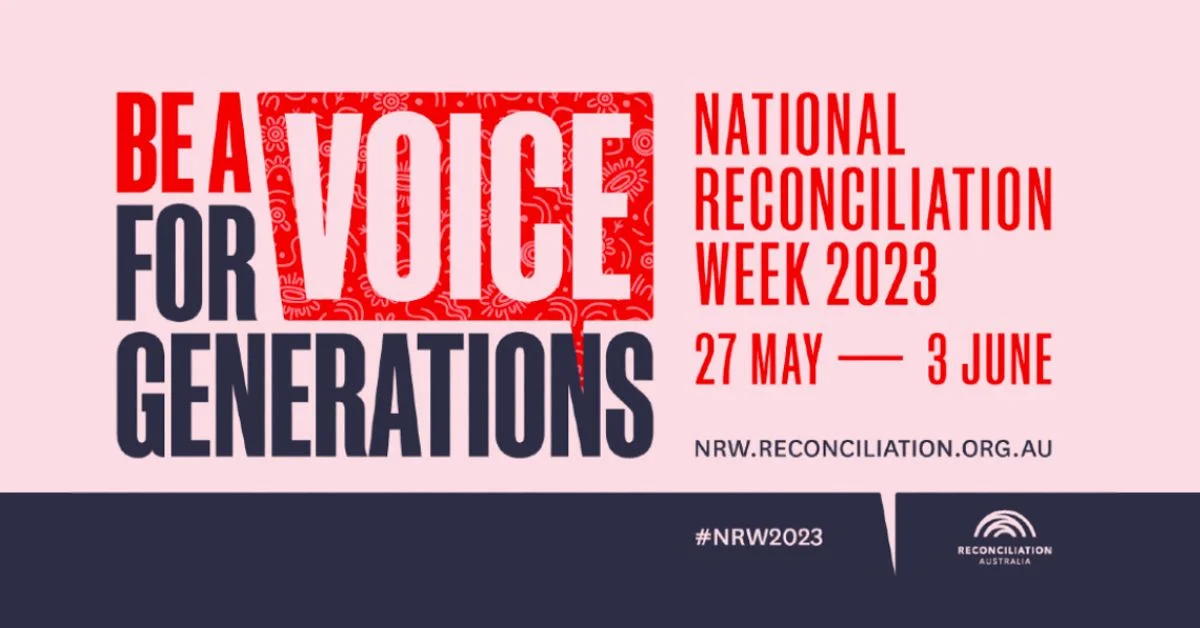Mental Health First Aid Australia recognises Aboriginal and Torres Strait Islander peoples as the First Australians.
Our formal reconciliation journey began in 2022, as we started to change our ways of working and move towards building a stronger and more unified future together.
Part of this journey also means making meaningful steps towards acknowledging the past – reflecting on our shared histories, cultures, achievements, and how each of us can contribute to achieving reconciliation in Australia.
This year’s National Reconciliation Week theme – “Be a Voice for Generations” – is an opportunity for us all to be the voice for change. To help us voice our commitment to meaningful change in support of reconciliation, we asked our Mental Health First Aid Australia employees to share their reflections on reconciliation.
Below is just a snapshot of what reconciliation means to those working at Mental Health First Aid Australia, some of the proactive steps our staff plan to take this year to learn more about Aboriginal and Torres Strait Islander cultures, and why we believe it is so important for our organisation and the wider community.
What does reconciliation mean to you?
Reconciliation is taking accountability for past wrongs, learning from them, seeking out opportunities to grow, listening to those with lived experience, prioritising the voices of First Nations Australians and taking action, now and ongoing, to create a community where the rich culture and history of Aboriginal and Torres Strait Islander people is celebrated.
Reconciliation is complex, but a key component for me is being reflective. This helps me recognise when I have gotten something wrong (or not quite right) and helps me to do better next time. It is about deeply listening to Aboriginal and Torres Strait Islander voices with humility and a willingness to put into action what I hear.
Learning, listening, and asking questions to better understand Australian history, traditions and the challenges that face First Nations People.
To me, reconciliation means taking accountability for past injustices and working towards healing informed by Aboriginal and Torres Strait Islander people.
Seeking to heal the generational trauma that colonisation, as well as a lived experience of discrimination, racism, stigmatisation and cultural ignorance has caused.
To me, reconciliation means building strong relationships and trust.
To me, reconciliation means showing respect to Indigenous people.
Reconciliation means acknowledging what the traditional owners of our great land went through, and continue to go through, as we operate with a Western culture. While I’ll never understand what it’s like, my aim is to teach my children to appreciate what it would be like for an Aboriginal or Torres Strait Islander person.
Reconciliation means being an ally and learning from First Nations people and their ancient wisdom, which is so relevant and meaningful today, and unlearning racist tendencies that have been instilled in a colonial, patriarchal system, and addressing mine and others’ white privilege, to be able to see with open eyes the importance of reconciliation.
What steps will you take this year for reconciliation?
This year I will actively seek out opportunities to extend my knowledge about Indigenous cultures, and how I can acknowledge and celebrate this in my daily life. I will also try to understand how I can make an impact in communities across Australia who need support.
This year I want to challenge stereotypes and prejudices. I’ll try to be more aware of the harmful effects of stereotypes on Indigenous communities and work towards dismantling them in my own conversations and encourage others to do the same.
Read articles and watch or listen to segments that educate myself around how to support reconciliation. Have discussions with friends and family to better understand the inequality between Aboriginal and Torres Strait Islander people and non-Indigenous people.
I will learn about culture through listening, circles, and trainings with First Nations providers.
I would like to learn more about the area I live in, in terms of both the original inhabitants and the current Indigenous community.
Why do you believe
reconciliation is important?
Reconciliation is the absolute minimum we should be striving towards to acknowledge the traumatic events experienced by First Nations Australians. This should not be an ‘end goal’, it should be a goal in everything we do, big or small, every day, in every choice.
Reconciliation is important because it turns our awareness to the essential nature of restoring harmony and equity and access, to all Traditional Custodians, which cannot heal what has happened before, but can begin to heal what will happen ongoing.
Everyone deserves to be treated equally. Reconciliation is important because while we cannot go back and change the past, we can set up the future generations of our country to learn the mistakes of history. My children deserve to know the full history of this country. As a family, we learn through art, music and reading. My children are already better informed than I was when I was a child. This is important so we can set up a future of collaboration, unity and equality.
Reconciliation is important because it acknowledges historical injustices, promotes social justice and equity, recognises Indigenous rights and cultures, builds stronger communities, seeks truth and healing, contributes to nation-building, and fulfils our international obligations. It is a vital process for creating a more inclusive and just society for all Australians.
I am proud that our organisation has an Aboriginal and Torres Strait Islander MHFA program, with a dedicated focus and commitment to accessible MHFA courses for different Indigenous groups. I think this work is important in assisting with the mental health literary of Indigenous Australians but also that it enables Aboriginal and Torres Strait Islander perspectives and input.
Further information
For more information about National Reconciliation Week visit: https://nrw.reconciliation.org.au


